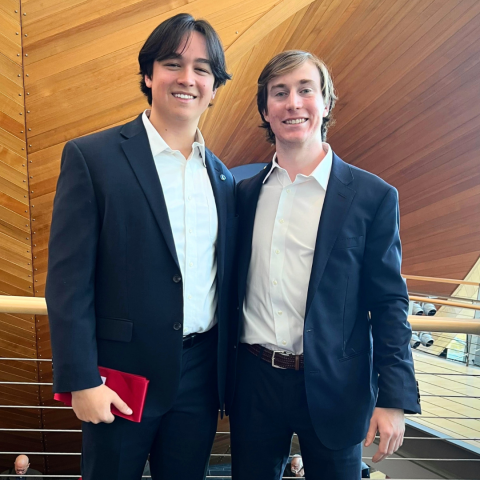
When Nick Khoo and Sean Mullen arrived as first year students at Rensselaer Polytechnic Institute in 2021, they stepped onto a campus still in recovery. The pandemic had gutted student life, club activity was sparse, and the Lally School of Management lacked the clear leadership and structure that incoming students expected. For many, the uncertainty might have been a reason to wait things out. But for Nick and Sean, it became a call to action.
Three years later, they’ve built something far more enduring than a club.
From Nothing to Network
Like many students pursuing finance, Nick and Sean began their journey trying to navigate the high-stakes world of internships and recruitment. Along the way, they noticed something others hadn’t: an untapped network of engaged alumni ready to support students—if only someone would reconnect the dots.
The two joined the Buttonwood and Roebling Club, a finance group with sparse activity and minimal traction. But by the end of their sophomore year, they organized a breakthrough event: an end-of-year alumni panel that brought successful graduates back to campus. What started as a networking opportunity quickly became something bigger.
“We realized there was a community out there that just needed to be reactivated,” Sean said. “And that if we created a platform for connection, it could help a lot more students than just us.”
Rebranding, Rebuilding, and Running Like a Business
That realization led to a rebrand. The Rensselaer Finance Club (RFC) was born—and it wasn’t just another student club. From the beginning, Nick and Sean structured it like a business, assigning leadership roles in alumni relations, employer partnerships, campus events, and marketing. The initial meetings relied heavily on guest speakers and knowledge-sharing from their own internship experiences. But as engagement grew, so did the club’s scope.
Still, building from scratch had its share of challenges. With no formal funding and no affiliation to the student union, early progress was powered by pure scrappiness.
“We didn’t even sign up for a table in the union—we just showed up,” Sean laughed. “We were determined to make this work our way, even if it meant operating outside of the normal process.”
This independence allowed them to move quickly, build momentum, and attract student leaders who saw the club as more than just résumé filler.
Creating Real-World Experience and Access
The RFC now mirrors the structure of a professional firm, offering students hands-on experience with everything from employer relations to investment management. One of its most impactful achievements? Relaunching the James Fund, a student-managed investment fund that had gone dormant during the pandemic.
Nick and Sean researched similar funds at other institutions, developed a 25-page proposal, and secured institutional support to manage real capital—giving students practical experience they can leverage in competitive internships.
“We wanted to give students something they could talk about in interviews, something real,” Nick said. “Not just theory, but actual fund management.”
A Legacy of Alumni Generosity
What makes the Rensselaer Finance Club—and the broader Lally experience—exceptional is the strength and spirit of its alumni community. Many of the alumni who spoke at events, mentored students, or returned to campus didn’t do so because they were asked formally. They showed up because they believe in giving back.
“The people we met weren’t just willing to help us,” Sean explained. “They wanted to help everyone coming up after us. That culture of accessibility and support is something we’re proud to pass on.”
This ethos of alumni generosity has become a foundational piece of RFC’s success. Alumni regularly offer job referrals, resume feedback, and guidance tailored to the unique challenges of breaking into finance from a STEM-oriented school. And because so many of them faced similar hurdles, their support feels authentic—and enduring.
“They understand what it takes,” Nick added. “They earned their way in, and now they’re reaching back to pull others forward.”
Culture Shift and Sustainable Leadership
While their efforts revived student interest in finance, Nick and Sean’s impact extends beyond Wall Street dreams. They shifted the culture at Lally—fostering a more collaborative, supportive environment where students from all backgrounds (including engineers and graduate students) could explore financial careers.
They also took mentorship seriously. As they transitioned out of leadership, they ensured a strong foundation remained, training and empowering new leaders like Grace, the incoming president, and building a community that would outlast them.
“We didn’t just want to run the club,” Sean said. “We wanted to build a system that others could lead, grow, and be proud of.”
Lessons in Leadership—and Grit
The real legacy of RFC may be the leadership lessons it instilled in its founders. Both Nick and Sean spoke about the power of taking initiative, embracing discomfort, and learning to navigate institutional complexity with patience and persistence.
“We didn’t wait for someone to fix things,” Nick said. “We got scrappy. We learned to lead by building, and by doing.”
Their partnership—built on trust, honesty, and a willingness to challenge each other—was key to making it all work.
A Vision for the Future
As they graduate, both plan to stay involved as alumni, mentoring new members and continuing to grow RFC’s reach and reputation.
“We’d love to come back in ten years and see students still building on this,” Sean said. “Giving tours of our offices to current members, seeing them land great roles—that would be amazing.”
Ultimately, what started as frustration grew into one of the strongest student-led success stories in recent RPI history. Through it all, Nick and Sean demonstrated that leadership isn’t about titles or perfect timing—it’s about building something that lasts. And thanks to a loyal alumni base and a renewed sense of purpose, what they’ve built is just getting started.